Straight Talk About the Food Chain
 April 22nd, 2008 by jules
April 22nd, 2008 by jules
Adrienne Furness from WATAT is gracing 7-Imp with her presence again this week. This time she and I (Jules, that is) are having a conversation about our favorite Slightly Demented Picture Books. Hubba wha? you say. Adrienne will kick it all off with an explanation. Enjoy! And we hope folks will join in and add to our list . . .
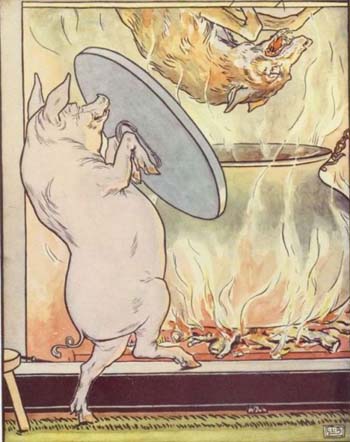 Adrienne: Back in August, Jules and I began bonding over our shared love of what we’ve decided to call Slightly Demented Picture Books. It started with Jules’ review of Bob and Otto, written by Robert O. Bruel and illustrated by Nick Bruel. She and I have been talking about Slightly Demented Picture Books ever since.
Adrienne: Back in August, Jules and I began bonding over our shared love of what we’ve decided to call Slightly Demented Picture Books. It started with Jules’ review of Bob and Otto, written by Robert O. Bruel and illustrated by Nick Bruel. She and I have been talking about Slightly Demented Picture Books ever since.
So what makes a picture book slightly demented?
These are books that we love and that kids love that make other adults uncomfortable. My favorite example is the version of The Three Little Pigs that I tell in my preschool storytimes. I like the more traditional version where pigs one and two get eaten. There is none of this being saved by the smarter brother. No deus ex machina woodcutter. Kids love this version of the story. They huff and puff right along with the big bad wolf, and they nod or giggle in a satisfied way when the wolf gets a good meal and moves on. Cautionary tales make sense to them: those pigs make their homes out of inferior materials and suffer the consequences. That’s life, and I think this kind of story helps children make some sense out of a world they often find mysterious and difficult.
My telling of this story bugs adults. Every time I share it, at least one or two ask me if I’m not worried about warping the children. Honestly, I’m more worried about the telling where pigs one and two are saved. The theme of the original story has to do with the way our actions have consequences. Versions in which the first two pigs are saved by the pig who built his house out of bricks suggest that someone smarter will be there to bail us out when we do something stupid. I think the real problem is that adults hate to talk to children about the ways in which life is difficult. I think they hope the children won’t notice.
Of course they notice, and so do we. In that spirit, we’d like to offer you some of our favorite picture books that tell big truths about life in a way that makes us laugh a little. Or a lot.
Jules: Adrienne, you couldn’t have said it better. Let’s delve right into our list of Slightly Demented Picture Books, shall we? And I’ll state up front that we do not claim that this list is comprehensive in any way whatsoever. This is just a start, the first ones that came to mind.
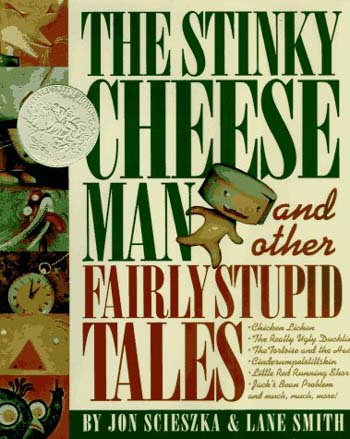 I’ll be so bold as to start with what I’ll call one of the Top-Five Most Classic Slightly Demented Picture Books of All Time, The Stinky Cheese Man and Other Fairly Stupid Tales by Scieszka and Smith. Wouldn’t you agree, Adrienne, that it’s perhaps one of the daddy demented books of ‘em all? I’ll never forget seeing that book for the first time when I was but a wee young lass. I think I was a sophomore in college then, working for minimum wage during the holidays in a book store. And I remember thinking, children’s books can be this wonderfully irreverent? Not to sound all name-droppy either, but I had the good fortune of meeting Adam Rex at the Southern Festival of Books last summer and having a bit of a chat with him. And somehow that book came up and the fact that he had a similar reaction to it — that it was rather pivotal in that way, making him realize that there is a place for the waggish, for the deadpan, for the zany (for lack of a better word here) in children’s lit. In fact, that book is what made him want to make his own children’s books. Pretty powerful, huh?
I’ll be so bold as to start with what I’ll call one of the Top-Five Most Classic Slightly Demented Picture Books of All Time, The Stinky Cheese Man and Other Fairly Stupid Tales by Scieszka and Smith. Wouldn’t you agree, Adrienne, that it’s perhaps one of the daddy demented books of ‘em all? I’ll never forget seeing that book for the first time when I was but a wee young lass. I think I was a sophomore in college then, working for minimum wage during the holidays in a book store. And I remember thinking, children’s books can be this wonderfully irreverent? Not to sound all name-droppy either, but I had the good fortune of meeting Adam Rex at the Southern Festival of Books last summer and having a bit of a chat with him. And somehow that book came up and the fact that he had a similar reaction to it — that it was rather pivotal in that way, making him realize that there is a place for the waggish, for the deadpan, for the zany (for lack of a better word here) in children’s lit. In fact, that book is what made him want to make his own children’s books. Pretty powerful, huh?
And, regarding what you had to say up there in your spot-on intro, Adrienne, I’ll never EVER forget reading for the first time “The Really Ugly Duckling” in this book: “What a nice-looking bunch of ducklings -– all except that one. Boy, he’s really ugly,” says everyone. But then the duckling didn’t care, knowing that one day he’d grow up to be a swan and bigger and better-looking than anything in the pond. Uh, NOPE: “Well, as it turned out, he was just a really ugly duckling. And he grew up to be just a really ugly duck.” And then there’s the unforgettable ending of “The Other Frog Prince” — with the frog yelling that he was just kidding and the princess wiping frog slime off her lips. Well, it’s not only screamingly funny to me—and was back then, too, when I first read it—and Scieszka’s not only reinvented these time-worn tales. But he also included a healthy dose of irreverence in the tales that probably made lots of adults uncomfortable. Plus, dude, kids can be so cruel, so “The Really Ugly Duckling” is rather refreshing to read and probably especially so for children, I would think.
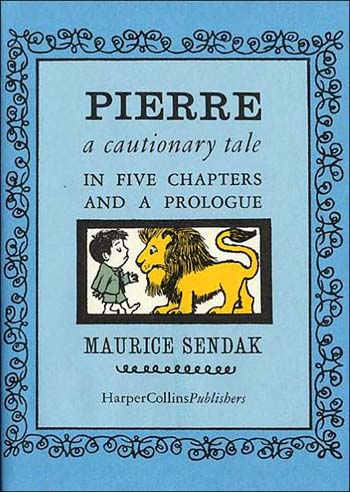 Adrienne, do you want to quickly talk about your addition of Sendak’s Pierre to this list? ‘Cause, come to think of it, it should perhaps be the Daddy of All Slightly Demented Picture Books.
Adrienne, do you want to quickly talk about your addition of Sendak’s Pierre to this list? ‘Cause, come to think of it, it should perhaps be the Daddy of All Slightly Demented Picture Books.
Adrienne: Yes, Maurice Sendak started writing picture books that make adults uncomfortable way back in the ‘60s. Where the Wild Things Are is constantly being challenged for its monsters and In the Night Kitchen for its nudity. As far as I’m concerned, the really subversive one is Pierre from Sendak’s brilliant Nutshell Library. The book is subtitled “a cautionary tale,” and it is. On the surface, it’s a story about how Pierre suffers the consequences of his actions and learns a valuable lesson, and that’s what it’s about…kind of. But look at what’s really going on. Pierre goes on with his  “I don’t care” until both his mother and his father imply that they’re going to leave him home alone while they go to town. Parents make threats like this all the time, but how many of them ACTUALLY LEAVE THE KID AT HOME? I mean, how old is Pierre? Five, maybe? Six? This may have been more normal in 1962, when the book was published, but still. Anyway, the parents abandon Pierre and then a lion comes along and eats him. The parents get home, freak out, and call in a doctor to extract Pierre, who emerges in a fine mood—suddenly, it turns out, he DOES care. Still, does he learn a lesson worthy of a cautionary tale? I don’t think so. The parents were way more upset than Pierre ever was, and I think they’re the ones that learned a lesson about not leaving their kid home alone, even if he is being a PITA. I think Sendak’s point has more to do with abandonment not being an acceptable parenting strategy. I’m surprised more parents don’t notice and complain about it.
“I don’t care” until both his mother and his father imply that they’re going to leave him home alone while they go to town. Parents make threats like this all the time, but how many of them ACTUALLY LEAVE THE KID AT HOME? I mean, how old is Pierre? Five, maybe? Six? This may have been more normal in 1962, when the book was published, but still. Anyway, the parents abandon Pierre and then a lion comes along and eats him. The parents get home, freak out, and call in a doctor to extract Pierre, who emerges in a fine mood—suddenly, it turns out, he DOES care. Still, does he learn a lesson worthy of a cautionary tale? I don’t think so. The parents were way more upset than Pierre ever was, and I think they’re the ones that learned a lesson about not leaving their kid home alone, even if he is being a PITA. I think Sendak’s point has more to do with abandonment not being an acceptable parenting strategy. I’m surprised more parents don’t notice and complain about it.
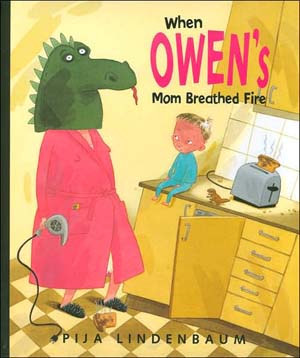 Jules: Good point, Adrienne. I haven’t really ever looked at Pierre in that light, and I’m an insufferable Sendak Nerd. Have you ever read When Owen’s Mom Breathed Fire by Pija Lindenbaum, an award-winning author/illustrator from Sweden? (I reviewed this title last year at 7-Imp.) It’s another tale of child-abandonment-for-a-day. Sorta. It’s about a mother who just. loses. it. This is something to which most mothers (if they’re human) can relate. Actually, that’s just it –- Owen’s mother becomes decidedly un-human for a day. She turns into a dragon. So, just her human form abandons him, though the dragon takes him out for the day. Anyway, it may be more quirky than demented, but it’s worth considering for our list. Ever seen it? I think it’s an intriguing tale (Kirkus Reviews called it a “shrewd fable”) about the resilience of children and all the coping mechanisms they must rely upon to deal with mama when she goes all loony from stress.
Jules: Good point, Adrienne. I haven’t really ever looked at Pierre in that light, and I’m an insufferable Sendak Nerd. Have you ever read When Owen’s Mom Breathed Fire by Pija Lindenbaum, an award-winning author/illustrator from Sweden? (I reviewed this title last year at 7-Imp.) It’s another tale of child-abandonment-for-a-day. Sorta. It’s about a mother who just. loses. it. This is something to which most mothers (if they’re human) can relate. Actually, that’s just it –- Owen’s mother becomes decidedly un-human for a day. She turns into a dragon. So, just her human form abandons him, though the dragon takes him out for the day. Anyway, it may be more quirky than demented, but it’s worth considering for our list. Ever seen it? I think it’s an intriguing tale (Kirkus Reviews called it a “shrewd fable”) about the resilience of children and all the coping mechanisms they must rely upon to deal with mama when she goes all loony from stress.
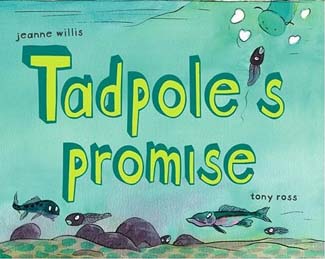 I’m going to jump right to a very demented picture book for which I have you, Adrienne, to thank for telling me to go read. Oh my, it made me laugh out loud. And that’d be Tadpole’s Promise by Jeanne Willis and Tony Ross. For those who haven’t read it, it’s about a star-crossed romance between a caterpillar and a tadpole. She begs him to never change, but he sprouts into a frog. Ah well, she forgives him, but then he continues to change and she breaks it off, all forlorn in her cocoon. Poor frog. Later, when the caterpillar––now a butterfly— changes her mind, she flies to frog to announce her forgiveness. And he eats her.
I’m going to jump right to a very demented picture book for which I have you, Adrienne, to thank for telling me to go read. Oh my, it made me laugh out loud. And that’d be Tadpole’s Promise by Jeanne Willis and Tony Ross. For those who haven’t read it, it’s about a star-crossed romance between a caterpillar and a tadpole. She begs him to never change, but he sprouts into a frog. Ah well, she forgives him, but then he continues to change and she breaks it off, all forlorn in her cocoon. Poor frog. Later, when the caterpillar––now a butterfly— changes her mind, she flies to frog to announce her forgiveness. And he eats her.
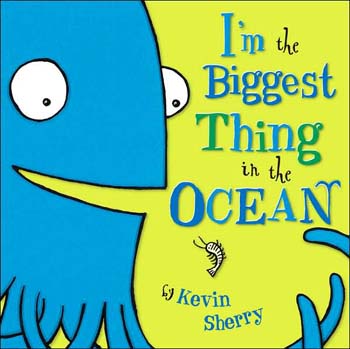 Adrienne, did I get that right? It’s been a while since I’ve read it, and I don’t have a copy here. Talk about making some sense out of a world children often find mysterious, as you mentioned in your intro! I think this book does that on a scientific, life-chain level (frogs eat bugs) and on a let’s-face-it-life-
Adrienne, did I get that right? It’s been a while since I’ve read it, and I don’t have a copy here. Talk about making some sense out of a world children often find mysterious, as you mentioned in your intro! I think this book does that on a scientific, life-chain level (frogs eat bugs) and on a let’s-face-it-life-
is-not-fair level, something children know entirely too well sometimes. Come to think of it, I’d put Kevin Sherry’s hysterical I’m the Biggest Thing in the Ocean (which perfectly captures the hubris of preschoolers) and Ugly Fish in the same category as Tadpole’s Promise. Sherry’s book is all about the unfair turns in life, yet our protagonist doesn’t let it get to him (to put it mildly), and Ugly Fish is almost the ultimate cautionary tale for the bullies of the world: Do unto others, or else! And WAIT! These books also bring to mind last year’s I’d Really Like to Eat a Child by Sylviane Donnio and illustrated by Dorothee de Monfried. The dark humor is something that, I think, might turn off a lot of parents, but I love that one. Have you seen these books, too?
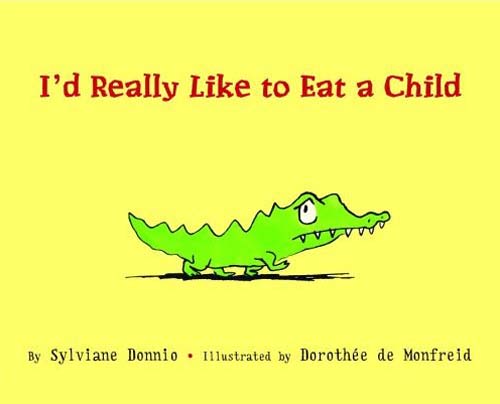
Adrienne: I finally read When Owen’s Mom Breathed Fire this past week when one of my colleagues gave it to me in a pile of books she was recommending I purchase to satisfy our rabid dragon fans at WPL. It seemed an odd choice for that and an odd book overall, more something for one of MotherReader’s Weird-Ass Picture Book Awards than a kid who wants a book about a dragon. I kind of wondered if Owen’s mother is Bipolar. I could certainly see this book as a way kids living with a parent with severe mood swings might begin to understand what’s going on. Goodness knows, plenty of kids live with parents who have mental illness, and very few picture book authors are talking about it.
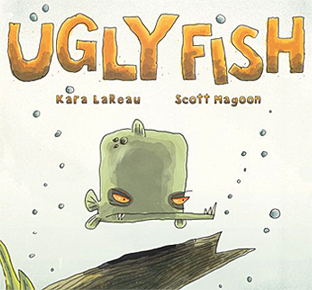 And who could forget Tadpole’s Promise? You did get the plot right. It’s interesting that all the books you mentioned in that paragraph feature characters who live in the water. Ugly Fish made me laugh and laugh and laugh when I read it, as did I’m the Biggest Thing in the Ocean. I think the current tendency is to support children’s self-esteem to a point that is almost crippling when they come up against people who will inevitably be bigger or smarter or quicker or funnier. We are all unique, but these books recognize limits, and why not do it like these books do—with a sense of humor?
And who could forget Tadpole’s Promise? You did get the plot right. It’s interesting that all the books you mentioned in that paragraph feature characters who live in the water. Ugly Fish made me laugh and laugh and laugh when I read it, as did I’m the Biggest Thing in the Ocean. I think the current tendency is to support children’s self-esteem to a point that is almost crippling when they come up against people who will inevitably be bigger or smarter or quicker or funnier. We are all unique, but these books recognize limits, and why not do it like these books do—with a sense of humor?
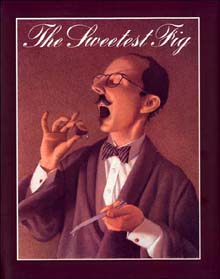
 Anger and spite seem to me to be some of the emo-
Anger and spite seem to me to be some of the emo-
tions adults have the most trouble seeing depict-
ed in picture books, even though they’re valid emotions their children are going to be dealing with. Back to Lindenbaum, who seems to be carving out her own little Demented Picture Books Niche, I think I learned about her Mini Mia and Her Darling Uncle from you, Jules. I love that angry little Mia and her jealousy over her favorite uncle’s new boyfriend: “And I don’t see Fergus anywhere. Perhaps he died or stepped on a nail.” Who hasn’t felt that? It’s brave of Lindenbaum to put that particular sentiment in a picture book, that’s for sure. In the end, Mia’s anger resolves itself with a nice, neat bow. In contrast, have you ever read Chris Van Allsburg’s The Sweetest Fig? I’m always surprised this one doesn’t show up on banned-books lists. The main character is a dog, Marcel, who is forced to put up with one mean SOB of an owner—a dentist, no less. The dentist is arrogant, mean, condescending, greedy. He’s exactly the kind of person adults like to pretend doesn’t exist, unless those people are in a position of seeing the error of their ways and repenting. The dentist sure doesn’t see the error of his ways, but he pays for them. Big time. As I like to say at the end of “Five Little Monkeys Sitting in a Tree”, that was a happy story for the alligator, but not so much for the monkeys.
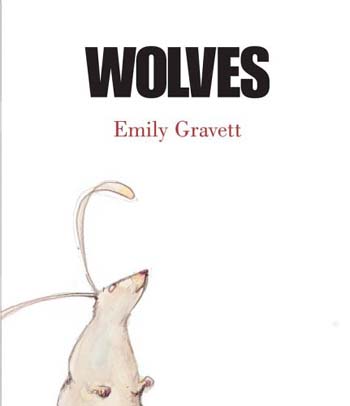 Animals happily eating other animals is aspect of a lot of these stories, “The Three Little Pigs,” I’m the Biggest Thing in the Ocean, Ugly Fish, Tadpole’s Promise. I can think of more: What Will Fat Cat Sit On? by Jan Thomas (which also uses the word “F-A-T,” which is, apparently, a Bad Word now in some circles) and Wolves by Emily Gravett. Animals eat other animals: it’s a fact of life. A lot of people are uncomfortable with this fact and seem to want to shield their children from it, which is kind of sad. The food chain drives, well, everything. It’s nothing to be afraid of.
Animals happily eating other animals is aspect of a lot of these stories, “The Three Little Pigs,” I’m the Biggest Thing in the Ocean, Ugly Fish, Tadpole’s Promise. I can think of more: What Will Fat Cat Sit On? by Jan Thomas (which also uses the word “F-A-T,” which is, apparently, a Bad Word now in some circles) and Wolves by Emily Gravett. Animals eat other animals: it’s a fact of life. A lot of people are uncomfortable with this fact and seem to want to shield their children from it, which is kind of sad. The food chain drives, well, everything. It’s nothing to be afraid of.
Jules: It’s funny you should say that about the food chain, Adrienne. My four-year-old is really obsessed with which animals are prey and which are predators. And I’d venture to say that is perfectly normal for a child that age. You’re right: It’s a fact of life, and I want her to know that life can be—will often be—unfair, just as it is for the fly that a frog eats (though she’s aware of her place on the food chain, that—unless she decides to hang out with, say, lions—she’s not going to get eaten any time soon). But just like I believe that fairy tales are good for her and help her see that, fundamentally, life can be cruel sometimes and you just have to be brave and try to get through it (as Gretel does), I think that not simplifying something like the food chain is important, too. “Straight talk about the food chain!” We can make it a new slogan.
And, speaking of food chain, have you seen the brand-new Hush, Little Dragon by Boni Ashburn and illustrated by Kelly Murphy? It brought “demented” to mind for me. It’s a variation on the classic folk lullaby, “Hush, Little Baby,” but it’s a wee dragon who wants a bed-time snack, and his mama dragon goes through just about every villager in the kingdom, including the king and queen, to try to feed him. More fun with the cruel, but necessary, food chain. I love it. {Kelly stopped by 7-Imp recently and shared a spread from it, which I’ll re-post here}:
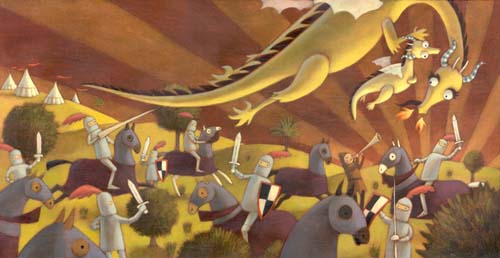
What you had to say about children and self-esteem today made me go “AHA!” and “BRILLIANT!” out loud, like I’m some kind of super-sleuth detective who found a clue. You nailed it. I’ve had more than one conversation recently with people about some recent study that said that children who are constantly told “you’re so smart!” (which comes from so many parents any more to their children, and over the simplest of things) don’t do as well in school as those who are told something like, “you worked really hard to do that, didn’t you? Congratulations” or some such utterance. And, God, someone’s going to nail me on this probably and tell me I got it all wrong. I also can’t quote the research study or direct you to it online, but that was the general idea of it. Anyway, yes, there’s so much propping-up of kids. There’s a great book called Confessions of a Slacker Mom (included in the first 7-Imp post I ever did, I think) in which she talks about a lot of things, but one of them is this notion that this CONSTANT praise for children over stuff they need to be doing anyway that doesn’t take any particular or impressive effort can be damaging to kids, and I can totally see that. And I mean “damaging” in the way you spoke of it -– it can be crippling to kids. You’re right that books like Ugly Fish just straight-up acknowledge that some people will be faster, some will be luckier, some will be bigger, etc.
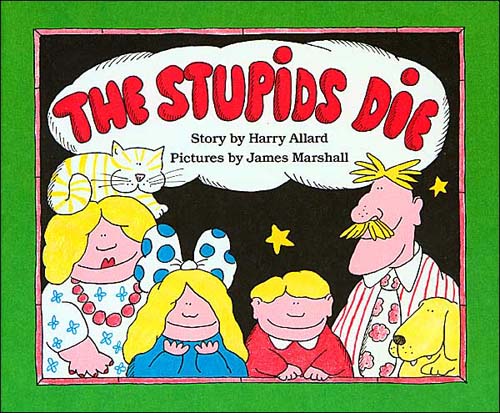
And, yeah, “fat” has become a bad word in picture books, huh? So is “stupid.” I took a graduate course from Jack Gantos once, and he opened up the course with this fabulous slide show, which I’ll never forget, in which he showed slides of what he thinks are the best picture books and creators (he mostly stood there, exclaiming things like “Maaaaaaax!” in his Jack-way and “Lily and her purse!”, etc.). Anyway, he flashed an image of James Marshall’s The Stupids and basically said The Stupids Die has to be the best picture book title ever and gets the award for Makes the Parents Squirm the Most. (Incidentally, I love this moment when Grandfather Stupid crashes through the living room wall on his motorcycle and informs the family that they’re in Cleveland, not heaven.)
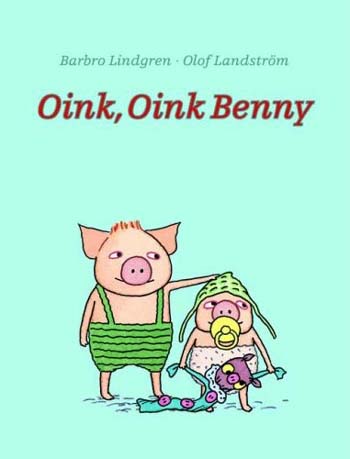 Do you know the Benny books by Barbro Lindgren and Olof Landstrom? I LOVE Benny. Very funny stuff from a Swedish author. Anyway, the new Benny book-–-Oink, Oink Benny–– is out (R & S Books, April ’08 — and it’s very good, I might add). Benny and his brother defy their mother and head to the mudhole to play. Lindgren totally writes, “Everyone is there. Some of their friends are really dumb. Some are really nice. Klara is the nicest.” And that makes my four-year-old laugh out loud. She looks at me first, as if to ask, is that okay? And that’s ‘cause adults are always telling children not to call others “stupid” or “dumb.” I think I actually stopped myself once, after saying that, and mumbled something about the fact that some people are actually often stupid. I’m sure I confused her.
Do you know the Benny books by Barbro Lindgren and Olof Landstrom? I LOVE Benny. Very funny stuff from a Swedish author. Anyway, the new Benny book-–-Oink, Oink Benny–– is out (R & S Books, April ’08 — and it’s very good, I might add). Benny and his brother defy their mother and head to the mudhole to play. Lindgren totally writes, “Everyone is there. Some of their friends are really dumb. Some are really nice. Klara is the nicest.” And that makes my four-year-old laugh out loud. She looks at me first, as if to ask, is that okay? And that’s ‘cause adults are always telling children not to call others “stupid” or “dumb.” I think I actually stopped myself once, after saying that, and mumbled something about the fact that some people are actually often stupid. I’m sure I confused her.
And, yes, the notion that Owen’s mother—in When Owen’s Mom Breathed Fire—is bipolar crossed my mind, too.
Adrienne: I haven’t seen Hush, Little Dragon yet, although it sounds like my kind of book.
I am so jealous that you got to take a graduate course with Jack Gantos (Talk about the ways in which life is unfair!), and he is so right—The Stupids Die is one of the best picture book titles ever. (Mental note to self: “Best Picture Book Titles Ever” would make a good topic for a blog entry).
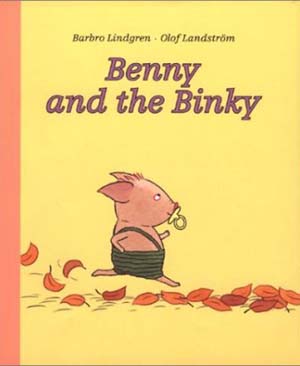 Oh, boy, and I also love Benny. Have you read Benny and the Binky? That one’s my favorite—such an honest response to a new sibling, and I love the illustrations of Benny running around all pissed off with that ridiculous stolen binky in his mouth.
Oh, boy, and I also love Benny. Have you read Benny and the Binky? That one’s my favorite—such an honest response to a new sibling, and I love the illustrations of Benny running around all pissed off with that ridiculous stolen binky in his mouth.
Jules, I could keep talking about this all day, but I’m thinking that our blog readers might have something else to do with theirs. Not that we aren’t going to keep talking about this every time another Slightly Demented Picture Book gets published, because we totally will.
Jules: Benny and the Binky is one of my favorite picture books ever.
Yes, this was fun. I really hope people add their favorite demented titles. Do you think anyone’s made it this far? Heh.
I take my girls weekly to the fabulous story times at the Nashville Public Library’s main library downtown, put on by three performers with Wishing Chair Productions. And one of those folks, who looks like Eisha’s husband walking around on stage, always reads these great, demented picture books. I don’t think I’ve ever told him how much I appreciate it that he does things like reads Ugly Fish after someone else reads Guess How Much I Love You? (but I did post about it once). When I know Library Pete’s there and gonna read, my heart is happy and I know I’m in for a demented treat.
Thanks for talkin’ demented books with me, Adrienne. And especially for nailing in that intro what their primary charm is for us and many children everywhere. Maybe occasionally we can post addendums to our list, as new demented titles emerge in this world. Until then . . . .

Ladies,
Love this topic and picked up on it for a post of mine own:
http://medinger.wordpress.com/2008/04/22/seven-impossible-things-
before-breakfast-%c2%bb-blog-archive-%c2%bb-straight-talk-about-the-food-chain/
[…] 22, 2008 Adrienne of WATAT and Jules of Seven Impossible Things Before Breakfast are having a Straight Talk About the Food Chain involving “slightly demented picture books.” Adrienne defines these as […]
This post totally makes my day! I am a closet demented PB reader (guess you’ve forced me out) and writer. I can’t tell you how many times editors have told me what I’ve written is “too over the top.”
Hooray for the Stinky Cheese Man et al!
This is great post, and not just because I’m in it. I now have a new shopping list to take to the bookstore.
I am TOTALLY going to go dig up my copy of “Stinky Cheese Man” and read it to my kids. I completely forgot about it! Thanks!
LOVED this post. Very smart. Very enlightening.
I appreciate this post, not just because it goes beautifully in-depth into the great weirdo books of our time, but also because it cleared something up for me. I always assumed that the Protagonist-Gets-Eaten storyline so popular these days (I’m the Biggest Thing in the Ocean, Wolves, Ugly Fish, Tadpole’s Promise, Whatever, etc.) was new. Now I see that it has an old proud lineage that can be directly traced back to my beloved Pierre (a song I actually have on my iPod). Appreciated!
and-spitting-him-back-out moment. I’ve said a bajillion times before that the spirit of Sendak is strong in Polly, whose work I adore.
This really might get me in trouble, but I think all of this boils down to how much respect people have for children — and I mean in terms of this brilliant bit Adrienne wrote: “I think the real problem is that adults hate to talk to children about the ways in which life is difficult. I think they hope the children won’t notice.” The way in which that might get me in trouble is that . . . well, let’s say I also understand the need to protect children, having two wee ones of my own. I know what Maya Angelou meant (I think it was her) when she talked about extending the innocence of children in today’s world.
I once was told by a parent — when about to start reading Simms Taback’s picture book adaptation of “There Was an Old Lady Who Swallowed a Fly” to a child — to “please skip the part in which the lady d-i-e-s.” Uh, that would be about every other line. Come on. Kids aren’t stupid. (Furthermore, in this particular instance, they’ve been hearing that demented old folk song for eons now, and they’re all doing perfectly fine, thanks very much). And I’ve seen story-time librarians almost apologize for the ending of that song, in which the lady keels over and dies. But, hey, swallow a horse, and that’ll happen.
Wow, brilliant feature. I think you’re totally right that some parents shy away from these topics because they want to avoid the inevitable and uncomfortable conversations that result. We love wading into this territory, and have read a bunch of these with glee. I know there are two or three others, but the names escape me at the moment…
Thanks so much for including me- “slightly demented” is high praise indeed! I’m flattered to have Hush profiled with so many other great books that are favorites of mine.
I’d suggest one more- Hungry Hen by Richard Waring.
Just this morning, Lucas and I passed a cat that had been hit by a car on the way to school. Lu didn’t notice it, but when I saw it, I reacted right away because I always do and, besides that, it looked like it had been hit fairly recently. So, anyway, I was like, “Oh, no. Come on, come on.” And I started walking faster. Lu asked me what was wrong and so I told him about the cat. We were past it far enough that you couldn’t see it anymore (it was in the grass), but he was craning his head back and asking all manner of questions, completely interested. *He* seemed able to deal with the dead cat just fine. It was *me* who had a problem. He inspires me to figure out how to talk about things sometimes, though, because I won’t not answer a question he asks.
Jules, Aren’t you excited that everyone’s so positive and interested and not like, “Wow! You two are Crazy Cakes!”?
Boni, I just read Hungry Hen (Have I mentioned lately that working in a library is The Best?), and oh my gosh that is funny. I am so going to read that in a storytime I’m doing tomorrow.
Damn skippy, Adrienne. I love this topic anyway, and it was great to talk further about it with you.
I think the other big part of this whole topic is this notion that children’s literature should be always cute and safe and sweet. You know how you run into people who think that all children’s lit authors and illustrators live in little, pink bubbles, as I think Gantos put it in that course I took? Yeah, I think that notion is still prevalent. He said in our interview with him last year that he doesn’t run into that anymore, and I’m not an author myself, but I still get that sense from a lot of mothers, in particular. I notice when I attend story times that, at the end of each book read aloud (with the exception of Library Pete’s Slightly Demented Books), there’s always a softly-sighed collective “Aw!!” from the mothers. There’s nothing wrong with that. I’ve uttered those AW!!s myself, and lots of children’s books elicit The AW!!s, but if it’s not AW!!-inducing, there’s always awkward silence, as if to say, hey, wait, that was supposed to be sweet. Ugly Fish definitely does not get an AW!!. Books like that always seem to throw parents.
I’m kinda obsessed with this topic, as is probably evident. Well, okay, “obsessed” is a strong word. It doesn’t keep me up at night. But how the average person on the street views children’s lit — and how children are treated and regarded in this country — is interesting to me.
I gotta find Hungry Hen as well as the one that Olivia suggested over at your post.
And, by the way, sorry you had to see a freshly-dead cat. That’s rough.
People think that children’s librarians live in little, pink bubbles, too, I’ve noticed. There’s this prevalent notion among people who don’t work with children that you have to be lobotomized or something to want to work with children. Teachers get the same thing (especially preschool teachers, who should seriously be getting medals for the work they do).
I love this post! Actually, even as a kid, I preferred the version of Three Little Pigs where the two pigs run over to the third pig’s house– it just seemed so lonely for the third pig afterward! Yes, I do understand the significance of consequences, though, which is why the Disney version made me so uneasy. The wolf escapes and never comes back, when he needs to be boiled alive and eaten so that he’s taken care of.
Here is a short list of books I never share at storytimes:
Don’t Call Me Little Bunny! by Gregoire Solotareff
Arlene Sardine–Chris Raschka
Goodbye Mog–Judith Kerr (yes, Mog dies!)
Zoo–Anthony Browne
I really like Van Allsburg’s The Sweetest Fig, and would share it as a picture-book for older kids when I had 2nd graders come in.
With “Old Lady Who Swallowed a Fly,” Nancy Stewart has a puppet who eats all the animals, dies, and then pops up and says, “Just kidding! And now I’m hungry again. Off to the zoo!” If you look at it in a certain way, that’s a little subversive as well.;)
I am a huge fan of “The Old Lady Who Swallowed a Fly” (I also have a puppet to go with it), and when I’m done with it, I always make a joke about how the old lady was on the Atkins Diet.
This post is amazing, you two. And I have a list of must-see books now, too. Thanks!
This is brilliant, you demented gals you.
You’re missing two of my favorites, though.
The Elephant and the Bad Baby, by Elfrida Vipont
(yes, you read that right; the BAD baby)
The Tiger who Came to Tea, by Judith Kerr
(the tiger drinks, among other things, all of daddy’s beer)
What is it about them Brits?
I love me some demented picture books too! Thanks for the awesome post. Plus, now when my three year old wants to have races with me I feel free to whoop her *ss once in awhile instead of always letting her win. And PS Where did you get to take this most excellent course with Jack Gantos?
Hi, Kathy. He taught a one-week summer course at The University of Tennesse when I was in grad school — I guess it was around ’02. It was about picture books. We had to write one, and it was one of the hardest thing I’ve ever tried to do. Mine sucked mightily.
I *love* Ugly Fish. And The Sweetest Fig is the hand’s down winner during our Chris Van Allsburg author study! I’ve always loved the slightly askew picture book.
My all time favorite demented picture book is Tommy at the Grocery Store by Bill Grossman (hilariously illustrated by Victoria Chess). I laugh every time I even think about this book.
It plays to every child’s deepest fear– abandonment– by having Tommy, a little pig who looks remarkably like a stuffed sausage, first forgotten at the grocery store by his mother. Mistaken for a salami (he was left in the deli section), he’s purchased by another shopper and taken home, where the wide-eyed Tommy watches as the woman raises a huge butcher knife…
“She was just about to slice him,” when she realizes to her shock that her salami has eyes; of course he’s therefore a potato. So the hapless Tommy is returned to the store and placed in the potato bin, where he’s again purchased and brought home and nearly decapitated… it goes on and on, punning merrily, until Tommy is at last reunited with his loving but remarkably careless mother.
How I adore this book– and how I wish it wasn’t out of print!
Thanks, Lynne. That’s hard-core demented there! I’ll try to find it, as well as the others here that people have mentioned.
Yup, hard core. Just like Hansel and Gretel. That’s the great thing about fantasy– it lets children look at their deepest darkest fears straight on, while retaining the comforting illusion that it’s all a big joke, just pretend, long ago and far away, nothing that could ever really happen. “Tell all the truth but tell it slant,” as Emily Dickinson so beautifully put it.
Oh I loved this post! I’ve always gravitated to the offbeat One of the most demented and popular picture books is William Steig’s The Amazing Bone. Here’s another life lesson- don’t dawdle on your way home from school (not that kids walk home from school alone anymore- for good reason.) And a talking bone- Weird! At least it saves her from being eaten. Now that I think of it most of Steig’s books are slightly demented.
I also enjoyed the discussion about trying to shield kids from unpleasant realities. Whenever you try it’s like they can feel you squirm and then all you get is But Why? Why?
GREAT post!
In the oldies-but-goodies subcategory:
a favorite in my house is THE SHRINKING OF TREEHORN, by Florence Parry Heide, illus. by Edward Gorey.
Also, WHO NEEDS DONUTS? by Mark Stamaty.
Whew! Breathing a sigh of relief now! I just purchased a book for my grand-daughters (Jule’s girls) about dinosaurs because they are so INTO them. It’s called “I Am a Tyrannosaurus” by Karen Wallace, and I love the illustrations by Mike Bostok. In the book, the Tyrannosaurus leaves his valley in search of meat and eats another dinosaur, leaving “the stink of its carcass” hanging in the air! Karen describes him as “tearing out great mouthfuls” and “crunching and gulping” a Triceratops! I ordered the book on title alone, and after reading it I wondered if I should give it to them. Julie informed me that Piper was fascinated with the food chain, and after reading this blog, I gues it will be okay after all. Although it is not done with humor or satire, it is the truth about life in the dinosaur age….
Hey, maybe I’ll write “Sir Tyrannosaurus Meets Owen’s Mom!”
*cracking up*
If this post had a soundtrack, the first track would be Food Chain by Eric Hutchinson.
Absolutely love the “Stupids” series. The Stupids Step Out was my first book challenge expeience my first year as a librarian. And I do think the Rotten Ralph books are among some of my most loved demented books.
[…] tattered copy of Roald Dahl’s Revolting Rhymes, so I pulled it off the shelf in honor of the recent post on “demented” stories that Adrienne and I did. Dahl’s version of Cinderella is […]
[…] to his style as well, what with his ultra-stylized design sense — not to mention the demented, deadpan humor and spirit of at least two of his books thus far (the very Pierre-esque Whatever and […]
[…] all its spontaneity and wit and wonder for you. However, I do hereby officially tack it on to the Straight-Talk-About-the-Food-Chain registry that Adrienne Furness and I began last […]
[…] line, “{h}ere, on the deck of the fishing boat, Arlene died.” But shoot, y’all. You know how I feel about books like this — and the fuss made over them. ‘Nuf said on […]
[…] objects on top of it and gasping whenever they see it in a new spot. Mwahahaha. And you all know I’m fond of books in which characters get devoured. As the illustrator puts it below—since both book-creators are here today to talk a bit about […]
[…] beast and a miserable end.” If this book had existed when Adrienne Furness and I composed our “Straight Talk About the Food Chain” / Slightly Demented Picture Books post, also one of my Most Favorites Ever, boy howdy and howdy […]
[…] of demented, quirky, even almost dark notes some of them strike (very subtly); you know I like my demented picture books. Again, this is mostly light-hearted whimsy you get here, but then there’s the Halloween […]
[…] and blogger extraordinaire Adrienne Furness and I discussed our favorite slightly demented titles back in April of 2008, and I’m always happy when I see titles to mentally add to the list. (For the record, […]
[…] having adventures. It’s a wonderfully warped, dark tale, which I’ve mentally added to this ever-growing list of Slightly Demented books. Or, if you’re Bob Shea and Lane Smith weighing in on the book: […]
[…] me laugh every time I see it. (Yup, I right away mentally added this one to the growing list of Slightly Demented Picture Books, which Adrienne Furness and I composed years ago, still one of my favorite […]
[…] stories, rendered in big cartoon art, for so-called emerging readers, involving a slightly macabre, straight-talk-about-the-food-chain kind of humor. (The frog manages to catch and consume a fly in each story, since that’s how […]
[…] by Barbro Lindgren and illustrated by Olof! Oh, how I love those books, which once appeared in this post I co-wrote with Adrienne […]